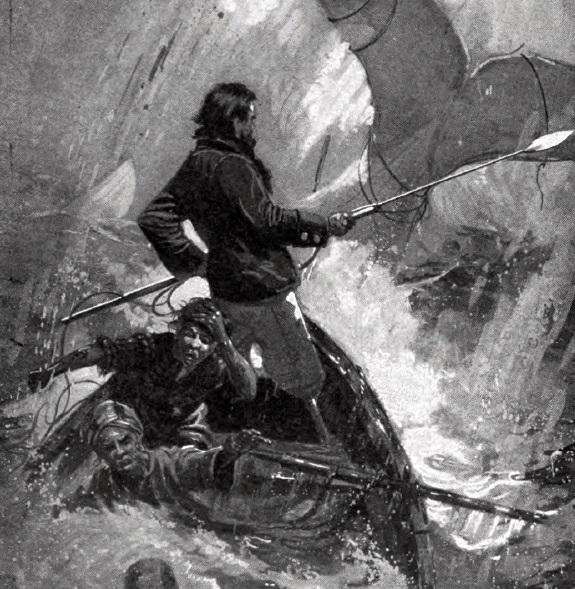
by Richard Subber | Feb 25, 2023 | American history, Book reviews, Books, History, World history
engrossing, but not Larson’s best…
Book review:
Dead Wake: The Last Crossing of the Lusitania
by Erik Larson (b1954)
Crown Publishers, New York, 2015
430 pages
I’m a fan of Erik Larson, starting with The Devil in the White City. Dead Wake offers a similar reading experience in Larson’s “no frippery” prose, and with a consistent tension that makes it a page turner.
I confess that it’s hard to avoid the somewhat deadening spoiler in this story: from Page 1, we know how it’s going to end. Torpedoed by Germany’s U-20, the Lusitania went down in about 18 minutes. Larson’s approach is exclusively chronological; it’s not a bad thing, but I found myself almost thinking out loud—“let’s get on with it”—as I navigated through the certainly more than adequate number of anecdotal scenes involving the ill-fated passengers and their clothing/meals/flirtations/premonitions/self-assurances…
Full disclosure: to the end, I was rooting for passenger Theodate Pope to get some love in her life. On the other hand, I now know far more than I care to know about President Wilson’s mushy courting of Edith Galt (who became his second wife).
The thing is, Larson tells a great yarn here but he doesn’t invite the reader to grapple with it. It falls short of shattering, consequential drama. The sociable elements—the almost chatty context—of much of his tale seem to displace full engagement with the terror of the event, and the outcomes that it hastened.
Larson tries to invest this story with solemnity, respect, and understanding.
Dead Wake is a dutiful—indeed, engrossing—account, but it doesn’t quite rise to the occasion.
* * * * * *
Book review. Copyright © Richard Carl Subber 2023 All rights reserved.
Play review: A Doll’s House
Henrik Ibsen’s classic on abuse…
–
Writing Rainbows: Poems for Grown-Ups with 59 free verse and haiku poems,
and the rest of my poetry books are for sale on Amazon (paperback and Kindle)
and free in Kindle Unlimited, search Amazon for “Richard Carl Subber”
* * * * * *

by Richard Subber | Feb 22, 2023 | Book reviews, Books, Books Commentary, Joys of reading, Language, Poetry, Reviews of other poets
Moby-Dick and stuff….
I know whale tales aren’t for everyone.
If you’re still with me, you might be interested to know that Herman Melville’s iconic whale story was published 172 years ago in London, and then, a month later, in New York.
The original title is Moby-Dick; or, The Whale. Melville actually went to sea in the crew of a whaling vessel, and based his novel in part on a real sperm whale named Mocha Dick, known to South Pacific sailors in the 1840s.
During his lifetime Melville was briefly well-known for some of his South Pacific stories, such as Typee, but he was obscure during the last 30 years of his life. He earned only $1,200 or so from the sale of about 3,200 copies of Moby-Dick, which was out of print when he died in 1891.
A high quality first edition of the book can easily be secured now if you have about $60,000 to spare.
Melville wrote in a variety of genres—again, not for all tastes. I’m a big fan of Moby-Dick, and I’m also an advocate for Bartleby, the Scrivener: A Story of Wall Street. Nothing of the South Pacific here. The circumstances of this desiccated short story are curious, even eccentric, incredulous. The withered and aloof Bartleby is presented, examined, and disdained, until his very dispirited isolation makes him the object of the narrator’s genuine but increasingly troubled caretaking.
Don’t overlook Billy Budd, Sailor. It’s a searing morality play.
You may be surprised to know that Melville also wrote poetry. One critic has somewhat ponderously suggested that Moby-Dick is filled with Melville’s incipient poetry. I certainly believe that a story can contain a poem, in any defensible sense of those two words. I’m not ready to think of Ahab and Ishmael and the whale as characters in a longish poem.
* * * * * *
Book review. Copyright © Richard Carl Subber 2023 All rights reserved.
Old Friends (book review)
Tracy Kidder tells truth about old age…
–
As with another eye: Poems of exactitude with 55 free verse and haiku poems,
and the rest of my poetry books are for sale on Amazon (paperback and Kindle)
and free in Kindle Unlimited, search Amazon for “Richard Carl Subber”
* * * * * *

by Richard Subber | Feb 20, 2023 | Human Nature, Tidbits
wanderer…
“I am the highway
and a peregrine
and all the sails that ever went to sea.”
Prodigious words by Robert Kincaid, in The Bridges of Madison County (by Robert Waller, 1995, p. 153)
Francesca Johnson confessed that she was “overwhelmed by his sheer emotional and physical power,” and those words were his response.
A peregrine is a falcon, of course, and it also means foreigner, alien, rover, wanderer, migrant, stranger…
…but love is not a stranger in The Bridges of Madison County.
* * * * * *
Copyright © Richard Carl Subber 2023 All rights reserved.
Book review: The Scarlet Letter
the beating hearts…by Nathaniel Hawthorne
–
Writing Rainbows: Poems for Grown-Ups with 59 free verse and haiku poems,
and the rest of my poetry books are for sale on Amazon (paperback and Kindle)
and free in Kindle Unlimited, search Amazon for “Richard Carl Subber”
* * * * * *

by Richard Subber | Feb 19, 2023 | Human Nature, My poetry, Poetry
giving is all…
Santa’s helpers
Bows and ribbons all around,
we’re on the floor
wrapping in the dark hours,
and we unwrap our hearts
and share great gifts,
again and again.
December 25, 2022
Delightfully inspired by “Every Christmas Eve” by Rosemerry Wahtola Trommer, December 25, 2022, on her website, www.ahundredfallingveils.com
* * * * * *
My poetry. Copyright © Richard Carl Subber 2023 All rights reserved.
Book review: “Bartleby, the Scrivener”
Think about loneliness beyond understanding…
by Herman Melville
–
In other words: Poems for your eyes and ears with 64 free verse and haiku poems,
and the rest of my poetry books are for sale on Amazon (paperback and Kindle)
and free in Kindle Unlimited, search Amazon for “Richard Carl Subber”
Your comments are welcome—tell me what you’re thinking.
* * * * * *

by Richard Subber | Feb 17, 2023 | Book reviews, Books, Joys of reading, Reviews of other poets
and rich biographical sketches…
Book review:
An Anthology of the New England Poets
From Colonial Times to the Present Day
Louis Untermeyer, ed.
New York: Random House, 1948
A handy and hearty sampling of the work of nearly 35 American poets, collectively spanning about 340 years. For the beginning student of American poetry, this is a heady introduction.
The big names are included, of course: Frost, Longfellow, Millay, Dickinson, Thoreau, Holmes, Whittier, Emerson.
The other selected poets offer a variety of voices and sensitivities and styles.
Untermeyer does first-class service as editor, with his rich biographical sketches of each poet and a reference framework of his/her times. For my taste, the sketches of many of the poets were more informative and appealing than their works.
Untermeyer doesn’t presume to rate the poets, of course. He offers a well-informed understanding of the evolution and expression of poetry among New England writers.
Here’s a morsel:
“I am a parcel of vain strivings tied
By a chance bond together,
Dangling this way and that…”
From “I Am a Parcel of Vain Strivings Tied” by Henry David Thoreau (1817-1862), written in 1841
* * * * * *
Book review. Copyright © Richard Carl Subber 2023 All rights reserved.
The “pack horse librarians”…
…before there were bookmobiles…
–
My first name was rain: A dreamery of poems with 53 free verse and haiku poems,
and the rest of my poetry books are for sale on Amazon (paperback and Kindle)
and free in Kindle Unlimited, search Amazon for “Richard Carl Subber”
* * * * * *




